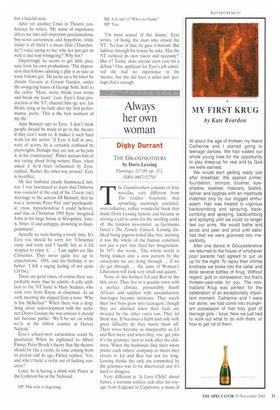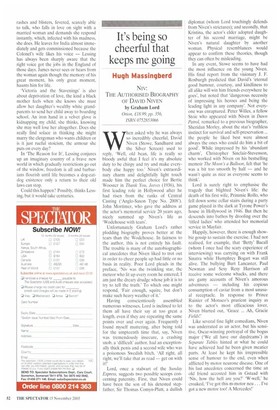Always her own woman
Digby Durrant
THE GRANDMOTHERS by Doris Lessing Flamingo, £15.99, pp. 311, ISBN 0007152795
he Grandmothers consists of four novellas, very different from The Golden Notebook, that sprawling, seemingly unedited, over-talkative, rather wonderful book that made Doris Lessing famous and became as stirring a call to arms for the swelling ranks of the feminist movement as Germaine Greer's The Female Eunuch. Lessing disliked being pigeon-holed like this, insisting it was the whole of the human condition not just a part that fired her imagination. In 1971 she wrote, The whole world is being shaken into a new pattern by the cataclysms we are living through ... if we do get through ... the aims of Women's Liberation will look very small and quaint.'
None of this bothers Lil and Roz in the title story. They live in a seaside town with a perfect climate, presumably South African, and saddled with unsatisfactory marriages become intimates. They watch their two boys grow into teenagers, though they are alarmed when their beds are invaded by the other one's son. They let them stay. It becomes a habit and only with great difficulty do they marry them off. Their wives become as inseparable as Lil and Roz were and when they, too, get jobs it's the grannies' turn to look after the children. When the husbands find their wives prefer each others' company to theirs they return to Lil and Roz but not for long. Lessing thinks the only sin committed by the grannies was to be discovered and it's hard to disagree.
Very different is 'A Love Child' about James, a wartime soldier, sick after his voyage from England to Capetown, a mass of rashes and blisters, fevered, scarcely able to talk, who falls in love on sight with a married woman and demands she respond instantly, which, infected with his madness, she does. He leaves for India almost immediately and gets commissioned because the Colonel's wife likes his voice — Lessing has always been sharply aware that the right voice got the jobs in the England of those days. James never sees or hears from the woman again though the memory of his great moment, his only great moment, haunts him for life.
'Victoria and the Stavenings' is also about deprivation of love, the kind a black mother feels when she knows she must allow her daughter's wealthy white grandparents to send her child away to boarding school. An iron hand in a velvet glove is kidnapping my child, she thinks, knowing she may well lose her altogether. Does she really find solace in thinking she might marry the clergyman who wants children or is it just rueful stoicism, the armour she puts on every day?
In 'The Reason for It', L,essing conjures up an imaginary country of a brave new world in which gradually restrictions go out of the window, freedom is all and barbarians flourish until life becomes a dog-eatdog existence only a return to their old laws can stop.
Could this happen? Possibly, thinks Lessing, but it would take centuries.



























































































 Previous page
Previous page